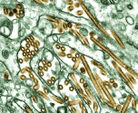|
From rxpgnews.com Avian Influenza An influenza vaccine produced with the use of insect cells appeared safe and produced an immunogenic response in healthy adults, suggesting promise as an alternative to using embryonated eggs for the development of influenza vaccine, according to a preliminary study in the April 11 issue of JAMA. âAll currently licensed influenza vaccines in the United States are produced in embryonated henâs eggs. There are several well-recognized disadvantages to the use of eggs as the substrate [the base on which an organism lives or grows] for influenza vaccine. Eggs require specialized manufacturing facilities and could be difficult to scale up rapidly in response to an emerging need such as a pandemic,â the authors write. They add that development of alternative substrates for influenza vaccine production has been identified as a high-priority. One potential alternative is use of the influenza virus hemagglutinin (HA; an antibody that causes red blood cells to clump together) using recombinant (genetic recombination) DNA techniques. The researchers found: âWe have shown that the rHA0 vaccine is well tolerated in healthy adults and immunogenic at both doses evaluated, and we obtained preliminary evidence of protection against influenza infection and disease. The safety data generated in this study are consistent with the safety profile observed in previous studies of rHA0 vaccine. These vaccines have been well tolerated at all doses administered and are associated with low rates of local reactions.â
âThe use of recombinant DNA techniques to express proteins in cell culture has been a successful approach for generation of highly effective vaccines for the prevention of hepatitis B virus and human papillomavirus. Among the available expression technologies, recombinant baculovirus is especially well suited for production of influenza vaccine because the rapidity with which genes can be cloned and inserted into this vector facilitates updating the vaccine at regular intervals. In addition, the extraordinarily high yields of protein possible in this system provide the opportunity to use much higher and potentially more effective doses of vaccine. Expression of the HA protein in insect cells using recombinant baculovirus also avoids the need to work with potentially pathogenic live influenza viruses and the attendant biocontainment issues that would be a particular concern for generation of pandemic vaccines. The preliminary demonstration of protective efficacy in adults provides further support for the development of this promising approach for prevention of seasonal and pandemic influenza,â the authors conclude. All rights reserved by RxPG Medical Solutions Private Limited ( www.rxpgnews.com ) |
